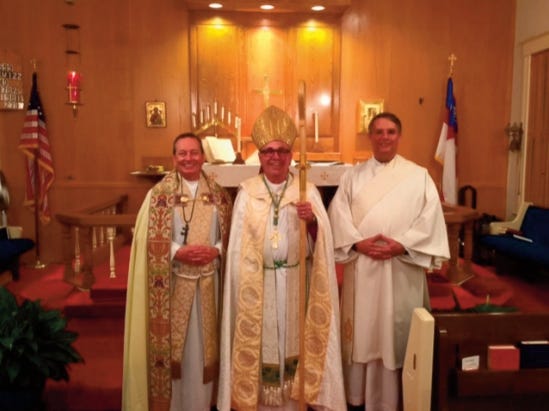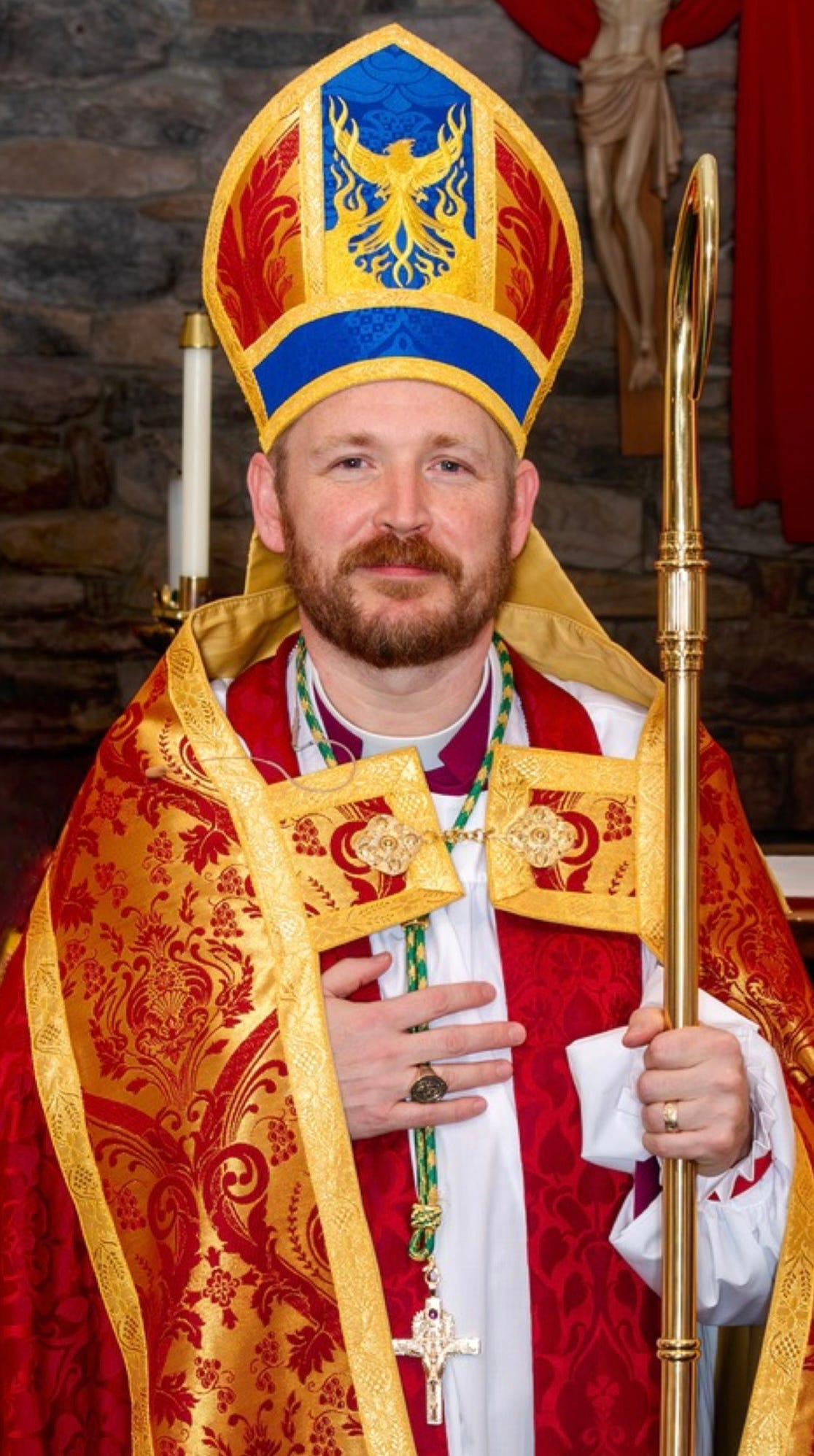About Us
The Convocation of the West is a missionary community of Christians and churches in the catholic Anglican tradition. Our community spans from Texas to the Pacific.
We reside within the Diocese of All Saints (ACNA).
Our Mission & Vision
We are a missionary people living out the historical, Biblical Christian faith…
Making disciples of Jesus Christ
Bearing fruit in every good work
And increasing in the knowledge and love of God.
Our Values & Commitments
Guided and empowered by the Holy Spirit:
We are committed to glorifying God in thought, word, and deed.
We are committed to passing on the ancient Christian faith as it has been delivered through the Anglican tradition.
We are committed to cultivating and equipping the whole people of God for the ministry of Jesus Christ in the world.
Contact Us
Convocation of the West
The Rev. Canon Michael Penfield
46 West Julian Street, Unit 208
San Jose, CA 95110
Newsletter enquiries, communications, web admin Fr Jonah Kelman: admin (at) dioceseofthewest.com or webmaster (at) anglicancow.org
Joining Us
If you feel called to be a missionary presence with us in the western US, contact the Vicar General.
History
The Diocese of the West was founded in 1998 as part of the Anglican Province of America (APA), a Continuing Anglican church in the Anglo-Catholic tradition. In 2008, its bishop, Richard Boyce, arranged for the diocese to affiliate with the Reformed Episcopal Church . To that point, the APA and REC had been in full communion, but Boyce sought for the Diocese of the West to have full participation in the Common Cause Partnership1 that led to the creation of the Anglican Church in North America in 2009. The Diocese of the West was the only diocese of the Continuing Anglican Movement to join the ACNA. In 2011, Winfield Mott, the coadjutor bishop of the West, became diocesan bishop upon Boyce's retirement. In April 2016, the diocese transitioned to a convocation in the Diocese of All Saints, at which point Bishop Mott became Vicar General of the Convocation of the West. Bishop Mott retired as Vicar General on August 31, 2016 and the Very Rev Canon Michael Penfield was unanimously elected Vicar General.
Our Leadership
The Very. Rev. Canon Michael Penfield, Vicar General of the Convocation of the West
Bio courtesy of Bishop Mott, from our September 2016 Newsletter :
Mike grew up in Maryland, of English and Sicilian parentage, in the Roman Catholic faith. He has two sisters and one brother. He has achieved both an undergraduate college degree and a law degree. After practicing law for a number of years, he decided that it was not a fulfilling profession for him, and became a grade school teacher instead. He is currently employed as a teacher in the San Jose school system, where he is currently living.
Sometime in the 1990’s, Mike found St. Luke’s Chapel in Los Altos Hills, and the Anglican Way. He became an active member of the parish, and was ordained a deacon near the turn of the century. Founded in 1963, St. Luke’s is one of the oldest Anglican parishes in the country, and by far the oldest in our former Diocese. By 2001, the current rector retired and Mike was ordained priest at St. Luke’s on May 18, 2001, by the Rt. Rev. John Lindenauer. Bishop Mott was ordained right beside him that day. They were part of the newly formed Christian Episcopal Church, one of a myriad of small “continuing” churches.
In 2003, Father Penfield, Bishop Mott and their parishes, along with three other parishes, joined with the Diocese of the West of the Anglican Province of America under Bishop Boyce, doubling the size of the Diocese. In 2008/2009 we all came together into the ACNA and REC, when the former was founded. Mike served as rector at St. Luke’s until March 2015. In the Diocese, he served at various times as an examining Chaplain, on the Standing Committee, Chancellor, and as Dean for California and Nevada, and was honored with the title of Canon.
The Rt. Rev. Darryl Fitzwater
Bishop Darryl Fitzwater is the 3rd Bishop Ordinary for the Diocese of All Saints, a non-geographic affinity diocese in the ACNA. He is the planter and Rector at Church of the Ascension in Charles Town, WV. Church of the Ascension now serves as the Cathedral for the Diocese of All Saints. He was consecrated on the Feast of St. Francis of Assisi in 2024 and enthroned as Bishop Ordinary on the Feast of Thomas Cranmer in 2025. He and his wife Becki have been married since 2000. They have two children, Aidan and Chloe.
The Rt Rev. Winfield Mott, Bishop-Retired
The Rt Rev. Winfield Mott became the second diocesan bishop of the Diocese of the West upon the retirement of Bishop Richard Boyce November 30, 2011. He lives in Columbus, New Mexico and served the parishes in Deming and Silver City, NM from 2000 until becoming the diocesan bishop of the Diocese of the West. He also is a member of the ACNA Ecumenical Relations Task Force and the ACNA Immigration Task Force. From 2011-2013, he served as Vicar General of the Anglican Diocese of the Southwest .
In April 2016, the diocese transitioned to a convocation in the Diocese of All Saints, at which point Bishop Mott became Vicar General of the Convocation of the West. Bishop Mott retired as Vicar General on August 31, 2016.
Bishop Mott grew up in Minnesota, graduated from the University of Minnesota, received an M.Div. from Wartburg Seminary and an M.A from the University of North Dakota (with a history major and Scandinavian language minor). He also did post-graduate study at the University of Lund, Sweden. He served for a decade in campus and parish ministry in the Lutheran Church, and taught history, homiletics and liturgiology. He has had a management career in health care administration, human resources, transportation and as assistant to a cabinet minister in Manitoba and has been an elected official on a school board, city council and fire district. He is married to Micki (née Campbell) and has four adult children and seven grandchildren.
In Memoriam:
The Rt. Rev. Richard Boyce was the bishop-retired of the Diocese of the West. In 2008, Boyce arranged for the then-APA diocese to affiliate with the Reformed Episcopal Church. To that point, the APA and REC had been in full communion, but Boyce sought for the Diocese of the West to have full participation in the Common Cause Partnership that led to the creation of the Anglican Church in North America in 2009. The Diocese of the West was the only diocese of the Continuing Anglican Movement to join the ACNA. Bishop Boyce is remembered in the May 2020 Newsletter.





